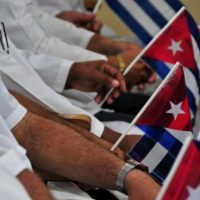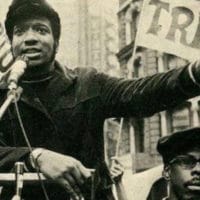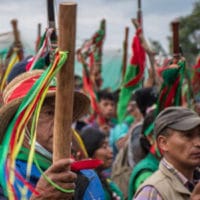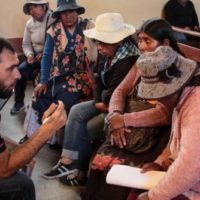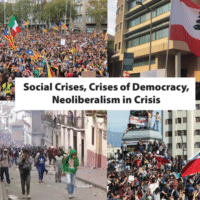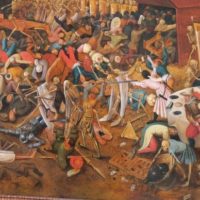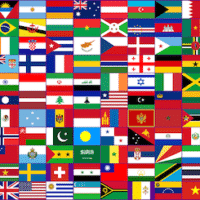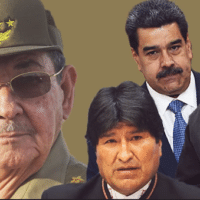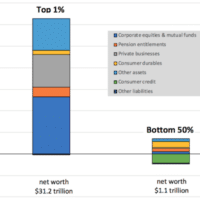-
Moving jobs to Mexico was a feature, not a bug, of NAFTA
The Washington Post (11/21/19) gave readers the official story about NAFTA, diverging seriously from reality, in a piece on the status of negotiations on the new NAFTA.
-
U.S. and allies target Cuba’s overseas medical missions
Three rightwing Latin American governments have forced out Cuban doctors at work in their countries. What they and the US government object to is the revolutionary vision and revolutionary praxis that they represent.
-
The Coming Revolution: Capitalism in the 21st Century
The Coming Revolution is an impressive guide for Marxists looking for a way to approach contemporary capitalism, argues Josh Newman
-
Good and dead
Chicago, never an enlightened city, where in a December 4, 1969 predawn west side raid at 2337 W. Monroe, fourteen cops in cahoots with, we now know, the FBI, blasted their way Capone style, ninety-nine flying bullets into a Black Panther apartment.
-
Harvesting the blood of America’s poor: the latest stage of capitalism
Blood has become big business in the United States and there is no shortage of corporations ready to exploit America’s most vulnerable populations in order to get a piece of the pie.
-
French parliament decides anti-Zionism is antisemitism
New Law Faced Critics Alleging it “Stigmatises and Silences ” Critics of Israel, and even those in Favour of 2 State Solution.
-
Overworked America
Those living in the U.S. are encouraged to think that they live in the best country in the world with little to learn from the experiences of working people in other countries. This sense is reinforced by the fact that the mainstream media generally discusses U.S. problems without reference to developments or trends in other developed capitalist countries.
-
Rap Brown Law today
The law was popularly named for African-American leader H. “Rap” Brown; its formal title was “The Civil Obedience Act of 1968.”
-
Influenced by corporate America: Adoption of dangerous social policies ‘destined to cause death’
For the past ten years, I have been identifying and reporting the inevitable preventable harm created by the adoption of neoliberal politics, the planned demolition of the UK welfare state and the influence of Unum Insurance since 1992 with successive British government(s).
-
Dossier 23: Peace, neoliberalism and political shifts in Colombia
Once again, the people of Colombia straddle two realities–the drums of war and the hope of peace. This tension has along, complex, and multi-dimensional historical process. This dossier from Tricontinental: Institute for Social Research examines the root causes of the crisis and the two realities of war and peace.
-
Members of Argentine Delegation in Bolivia tell the horror they recorded (Coup Repression)
Disappearances, murders, arbitrary detentions, rapes, torture and hospitals that refuse to take care of those wounded by the repression were some of the events recorded during the first day of work. They were held and kicked at the airport by a pro-coup mob. Then the Minister of Government of Añez, Arturo Murillo, came out to threaten them publicly: “Be careful, we are watching you.”
-
Social crises, crises of Democracy, neoliberalism in crisis
The current global social tensions have in common the rejection of inequality and the loss of democratic control. The engine driving these challenges may well be the fading relevance of neoliberalism, which is aggravating its own crisis and opening the door to confrontation.
-
Dying too young
If there ever was an argument in support of Medicare for All it’s this: despite spending more on health care than any other country, the United States has seen increasing mortality and falling life expectancy for people ages 25 to 64, who should be in the prime of their lives.
-
An alternative to liberal globalization
In the Bandung Conference of 1955, the governments and peoples of Asia and Africa expressed their ambitions to reconstruct a global system based on the recognition of the rights of countries that had previously been under the yoke of colonialism. In that period, “the rights to development,” as applied to the frameworks for negotiating multipolarity constituted the basis of globalization. These rights would force the imperial powers to adapt to new realities.
-
The Electoral College’s racist origins
The nation’s oldest structural racial entitlement program is one of its most consequential: the Electoral College.
-
Media wonder: Why can’t Venezuela be more like Bolivia?
Western corporate media outlets have often cried foul when foreign elections don’t go the way the U.S. empire wants them to, and find roundabout ways to label the violent attempts by vocal right-wing minorities to use military forces to overthrow leftist governments as “protests” rather than coups (FAIR.org, 5/16/18, 5/1/19).
-
Obama privately considered leading ‘stop-Bernie campaign’ to combat Sanders 2020 surge: Report
“From lofty heights, Obama has now become a dampener of hope, a barrier to change, and a threat to progress.”
-
How to commit war crimes—and get away with it
U.S. President Donald Trump sacked his Navy secretary on Twitter because he did not follow Trump’s advice and retain Navy Special Warfare Operator Edward Gallagher, despite Gallagher being accused of stabbing to death a wounded fighter, of murdering a schoolgirl and an elderly man, and then of obstructing justice.
-
Wages of debt
Elon Musk’s new Cybertruck would appear to be the perfect design for America’s contemporary dystopia.
-
Legalienate hails democratic coup in Bolivia
Legalienate editors Frank Scott and Michael Smith, who declared themselves co-president of the United States in February, today hailed the self-proclaimed presidency of Jeanine Añez in Bolivia as a harbinger of democratic self-determination throughout the world.


